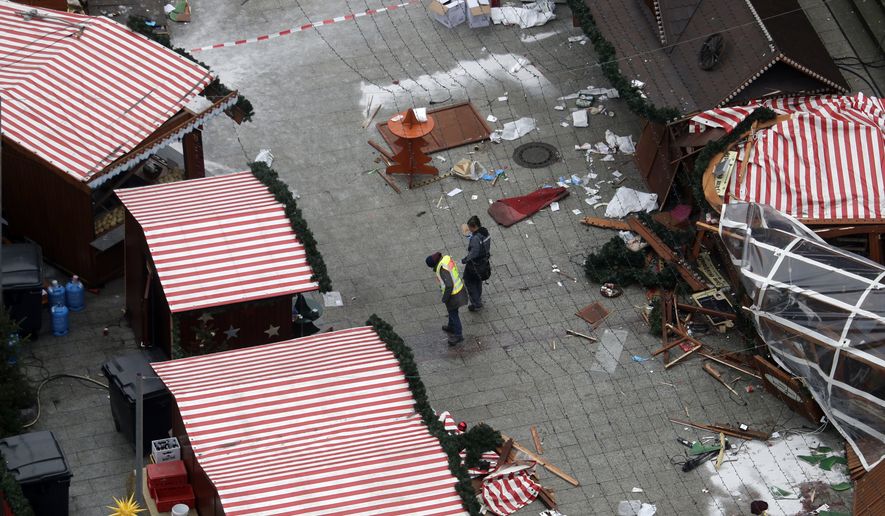The Christmas market attack in Berlin may have been the work of multiple terrorist operatives, according to German authorities who warned Tuesday that the deadly strike could be the first of several plotted against the city.
German Attorney General Peter Frank told reporters that a 23-year-old Pakistani asylum-seeker taken into custody following Monday night’s attack “may not have been the perpetrator or belong to the group of perpetrators” responsible.
By Tuesday afternoon, German officials had released the man because of insufficient evidence to hold him further. He has denied any involvement in the attack, The Associated Press said.
According to the Deutsche Welle, the nation’s public international broadcaster, a police chief told the Die Welt newspaper that “the true perpetrator is still armed, at large and can cause fresh damage.”
Authorities say 12 people were killed and 48 wounded Monday night when a tractor-trailer truck plowed through a Christmas market in West Berlin.
Holger Münch, the head of Germany’s Criminal Police Agency, warned Tuesday that further attacks may be coming. In the aftermath of such an incident, “there’s always a heightened risk of significant further attacks,” he said.
“We are investigating all potential leads,” Mr. Münch told Deutche Welle.
Monday night’s horror unfolded when a stolen tractor-trailer truck barreled through the Breitscheidplatz city square in the German capital, mowing down dozens of civilians attending the holiday market, an icon of the holiday season in Germany and Austria.
The stolen truck belonged to a Polish freight company, and its rightful driver was found dead in the vehicle, according to Reuters, which cited German Interior Minister Thomas de Maiziere as saying a pistol believed to have been used to kill him had not yet been found.
Reuters also cited German media as reporting that the man whom authorities detained had jumped out of the truck’s cab and run down the street toward the Tiergarten, a vast park in central Berlin.
German Chancellor Angela Merkel said Tuesday that German investigators were treating the attack as an act of terrorism.
“There is still a lot that we don’t know about this act with sufficient certainty, but we must, as things stand, assume it was a terrorist attack,” she said, noting the culprits would be punished “as severely as our laws demand,” The Associated Press reported.
Islamic State, al Qaeda or any other extremist group has yet to claim credit for the Berlin attack. However, Mr. Frank told reporters that the attack was reminiscent of July’s terrorist attack in Nice, France, and of the “modus operandi” deployed by Islamist terror group.
Eighty-six people were killed and 434 injured on July 14, when a Tunisian resident of France plowed a 19-ton cargo truck through crowds of Bastille Day revelers on the main beachside promenade in Nice. The Islamic State claimed credit for that strike, asserting in media posts that the attacker had answered the terror group’s call to target people living in nations fighting against the group.
Using cars and trucks as vehicular weapons to kill or maim as many people as possible is a low-tech strategy du jour being touted by Islamic State to its sympathizers and would-be terrorists to carry out so-called lone wolf attacks in the U.S. and Europe.
U.S. officials in Europe have been on edge during recent months about the prospect of an attack like the one that ripped through Berlin on Monday night.
On Nov. 21, the State Department issued a travel warning to Americans, asserting that “credible information” indicated the Islamic State and its affiliates were continuing to “plan terrorist attacks in Europe, with a focus on the upcoming holiday season and associated events.”
“Terrorists may employ a wide variety of tactics, using both conventional and non-conventional weapons and targeting both official and private interests,” the warning said, adding that “U.S. citizens should exercise vigilance when attending large holiday events, visiting tourist sites, using public transportation, and frequenting places of worship, restaurants, hotels, etc.”
• Carlo Muñoz can be reached at cmunoz@washingtontimes.com.
• Guy Taylor can be reached at gtaylor@washingtontimes.com.




Please read our comment policy before commenting.